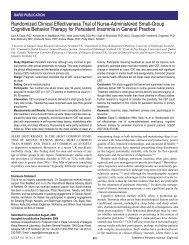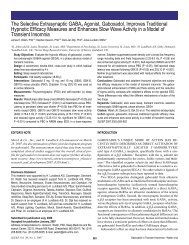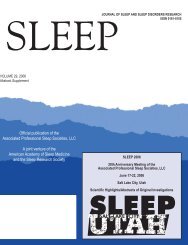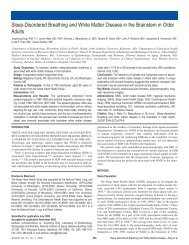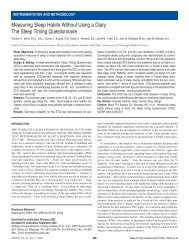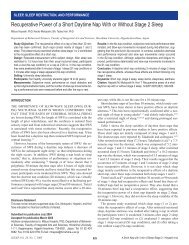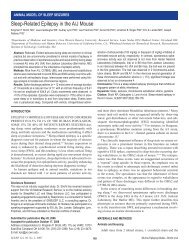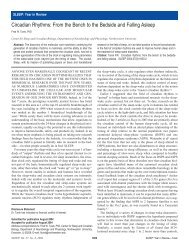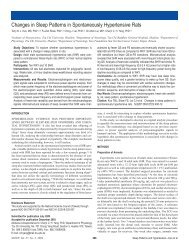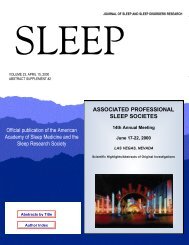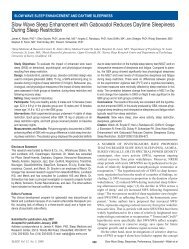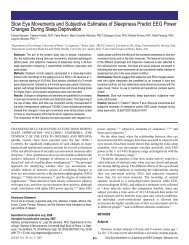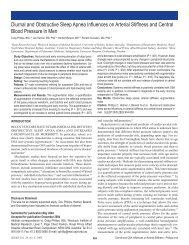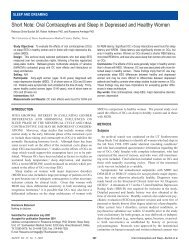SLEEP 2011 Abstract Supplement
SLEEP 2011 Abstract Supplement
SLEEP 2011 Abstract Supplement
Create successful ePaper yourself
Turn your PDF publications into a flip-book with our unique Google optimized e-Paper software.
B. Clinical Sleep Science IX. Psychiatric and Behavioral Disorders and Sleep<br />
NART-R, WTAR, Symbol Digit Modalities Test, Trail Making Test parts<br />
A & B, Seashore Rhythm Test, Speech Sounds Perception Test and the<br />
PASAT.<br />
Results: Preliminary results revealed a significant interaction between<br />
the self-reported symptom of being tired with type of ADD diagnosed<br />
(i.e.ADD vs.ADD Plus) on PASAT trial 1 scores F(1,1106)=6.10, p=.014<br />
and on PASAT trial 2 scores F(1,1095)=6.35, p=.012. Post hoc tests revealed<br />
an opposing effect of being tired for diagnosis of ADD vs. ADD<br />
plus on performance scores for both trials. A significant main effect for<br />
the self-reported symptom of finding it difficult to complete tasks was<br />
found to influence performance on PASAT trial 3 scores F(3,873)=3.45,<br />
p=.016.<br />
Conclusion: Findings indicate that tiredness and attention symptoms affect<br />
performance differentially in the two groups ADD and ADD plus.<br />
0726<br />
<strong>SLEEP</strong> INFLUENCE ON CARDIAC ACTIVITY IN ADULTS<br />
WITH AUTISM<br />
Pelletier M 1,4 , D’Antono B 2,5 , Chevrette T 1,4 , Mottron L 3,4,5 ,<br />
Godbout R 1,4,5<br />
1<br />
Sleep Laboratory & Clinic, Hôpital Rivière-des-Prairies, Montreal,<br />
QC, Canada, 2 Research Center, Montreal Heart Institute, Montreal,<br />
QC, Canada, 3 Centre d’Excellence en Troubles Envahissants du<br />
Développement de l’Université de Montréal, University of Montreal,<br />
Montreal, QC, Canada, 4 Centre de Recherche Fernand-Seguin,<br />
Hôpital Rivière-des-Prairies, Montreal, QC, Canada, 5 Department of<br />
Psychiatry, University of Montreal, Montreal, QC, Canada<br />
Introduction: Poor sleep is a frequent finding in autism and it has been<br />
shown to interfere with daytime functioning, using either behavioral (Limoges<br />
et al., 2005) or EEG measures (Daoust et al., 2004). Literature in<br />
typically developing individuals (TD) shows that sleep also influences<br />
the regulation of the autonomic nervous system so that the sympathovagal<br />
tone is normally higher in the morning compared to evening values.<br />
Studies of electrocardiographic (ECG) recordings suggest that there<br />
might be disequilibrium between sympathetic and parasympathetic activity<br />
in autism (Ming et al., 2005) but it is not known whether this observation<br />
is related to sleep or not.<br />
Methods: Fifteen men with ASD (22.3 ± 3.5 years) and 18 typically<br />
developing individuals (TD: 21.0 ± 4.2 years) were evaluated over two<br />
consecutive nights in a sleep laboratory. ECG samples were taken for<br />
5 minutes at bedtime and just before final rise time in the morning.<br />
Spectral analysis of the ECG signal was performed using a commercial<br />
software and the following four variables were extracted: total spectral<br />
power, low frequency power (LF: sympathetic tone), high frequency<br />
spectral power (HFabs: parasympathetic tone), normalized values of<br />
high frequency spectral power (HFnu). Groups were compared with<br />
Student’s t-tests.<br />
Results: Significant differences between evening and morning values<br />
were found only in the TD group, with lower evening values for total<br />
spectral power (p=0.008), LF (p=0.007) and HFabs (p=0.040) were all<br />
lower in the evening compared to morning. In the morning, significantly<br />
lower HFabs (p=0.043) and HFnu (p=0.027) values were found in ASD<br />
vs. TD groups.<br />
Conclusion: These results suggest that the effect of nocturnal sleep differs<br />
in TD and ASD individuals and that the parasympathetic tone is<br />
lower in ASD at rise time. Further analyses will focus on ECG activity<br />
during sleep, for each of the sleep stages.<br />
Support (If Any): Supported by the Canadian Institutes of Health Research<br />
and the “Fonds de la recherche en santé du Québec”.<br />
0727<br />
POOR SUBJECTIVE <strong>SLEEP</strong> WITH NORMAL OBJECTIVE<br />
<strong>SLEEP</strong> DURATION INCREASES RISK OF SUICIDAL<br />
IDEATION AND/OR ATTEMPTS<br />
Singareddy R 1 , Vgontzas AN 1 , Fernandez-Mendoza J 1 , Calhoun S 1 ,<br />
Shaffer M 2 , Bixler EO 1<br />
1<br />
Sleep Research & Treatment Center, Penn State College of Medicine,<br />
Hershey, PA, USA, 2 Public Health Sciences, Penn State College of<br />
Medicine, Hershey, PA, USA<br />
Introduction: Subjective sleep disturbances are associated with suicidal<br />
ideation and/or attempts (suicidal behavior =SB). Similarly, objective<br />
sleep disturbances were found to be associated with SB in clinical samples.<br />
One actigraphic study in non-clinical sample (n=49; ages 19-24)<br />
found sleep variability to be associated with SB, but was limited by lack<br />
of polysomnographic data. In this study we examined the association of<br />
polysomnographic (PSG) and subjective sleep with SB in general population.<br />
Methods: A subsample of 1741 (age >20) out of 16,583 randomly<br />
selected adults from general population underwent comprehensive assessment<br />
(history, physical examination) including suicidal ideation/attempts<br />
(SB) and PSG.<br />
Results: The prevalence of lifetime SB was 5.7%. Females (p=.011) and<br />
subjects with poor subjective sleep (p/=6hr of PSGsleep in comparison to poor subjective sleep and /=6hr of PSGsleep was 2.52 (CI:1.22-5.19).<br />
Conclusion: Subjective poor sleep with normal PSG sleep duration<br />
(>/=6hr) is associated with increased risk of suicidal behavior. It is possible<br />
that individuals with poor subjective sleep but normal objective<br />
sleep may have underlying poorer coping resources and more anxiety/<br />
rumination which may increase the risk of suicide.<br />
Support (If Any): National Institutes of Health grants RO1 51931 &<br />
RO1 40916<br />
0728<br />
SHARED METACOGNITIVE PROCESSES IN INSOMNIA AND<br />
ALCOHOL DEPENDENCE<br />
Hairston IS 1 , Conroy DA 1 , Arnedt J 2 , Armitage R 2 , Brower K 1<br />
1<br />
Substance Abuse Section, Psychiatry, University of Michigan, Ann<br />
Arbor, MI, USA, 2 Psychiatry, University of Michigan, Ann Arbor, MI,<br />
USA<br />
Introduction: Alcohol-dependent (AD) individuals typically report<br />
sleeping poorly. Investigations of the relationship between AD and insomnia<br />
largely focus on the impact of alcohol on brain function and on<br />
self-medication. However, a feature common to insomnia and addiction<br />
is ruminative preoccupation with sleep or alcohol, respectively. Such<br />
intrusive thought processes can be interpreted as metacognitions similar<br />
to depressive rumination. This investigation assessed whether abstaining<br />
alcoholics with insomnia (AD-INS) differed from alcoholics without<br />
insomnia (AD-NINS) and healthy controls (HCs), in their preoccupation<br />
with sleep quality.<br />
Methods: All subjects were recruited from the community. HCs (N=11)<br />
had no Axis I disorders. The AD-INS group (N=16) met research diagnostic<br />
criteria for insomnia, and the AD-NINS (N=15) did not. Both AD<br />
groups stopped drinking 3-12 weeks before the study; all participants<br />
adhered to an 11p-6a sleep schedule and completed daily sleep diaries at<br />
home for 1 week. Instruments included 3 ruminative scales—the Anxiety<br />
and Preoccupation about Sleep Questionnaire (APSQ), Response<br />
<strong>SLEEP</strong>, Volume 34, <strong>Abstract</strong> <strong>Supplement</strong>, <strong>2011</strong><br />
A250



